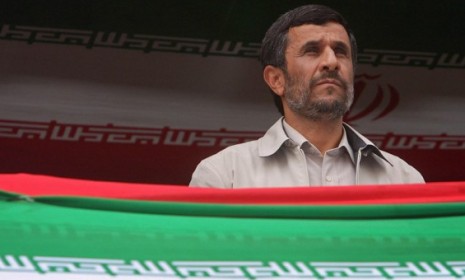Are talks with Iran hopeless?
Nuclear negotiations between Iran and Western powers flamed out in two short days. Is the time for talking over?

A free daily email with the biggest news stories of the day – and the best features from TheWeek.com
You are now subscribed
Your newsletter sign-up was successful
Nuclear talks in Istanbul between Iran and six world powers — the U.S., France, Germany, China, Russia, and Britain — ended in failure over the weekend. The six countries had hoped to revive a proposal under which Iran would ship much of its enriched uranium to France and Turkey, where it would be processed into fuel for nuclear power plants, but Iran refused to discuss the subject, miring the summit at what one European diplomat called "the pre-dialogue stage." No new talks are scheduled. Is this the end of the road for negotiations? (Watch a report about Iran's nuclear talks)
The time for talking is over: "It's no surprise that the latest round of nuclear talks with Iran have collapsed," says Jennifer Rubin in The Washington Post. President Obama's whole obsession with "talking" to Iran is based on a flawed premise: That Tehran has any interest in negotiating. Now that we've proved that, it's time for "more fruitful actions" like threatening military strikes, focusing on Iran's human rights abuse, and encouraging regime change.
"So why keep talking to Iran?"
The Week
Escape your echo chamber. Get the facts behind the news, plus analysis from multiple perspectives.

Sign up for The Week's Free Newsletters
From our morning news briefing to a weekly Good News Newsletter, get the best of The Week delivered directly to your inbox.
From our morning news briefing to a weekly Good News Newsletter, get the best of The Week delivered directly to your inbox.
The West raised the stakes too high: Why would Iran negotiate when the West radically changed the proposal on the table? asks Scott Lucas in Enduring America. The previous offer was for Iran to send about 60 percent of its low-grade uranium abroad; now the U.S. and its allies want 90 percent of its low-grade stuff and 20 percent of its quality uranium. That "core issue" was missing in U.S. newspapers, but it's why the meetings "failed to advance towards an agreement."
"How the U.S. media missed the important story..."
Diplomacy is risky, but it is still the best option: Iran is the one being "obstinate," and that doesn't serve it well, says the Bangkok Post in an editorial. "Every other civilized country" has given international inspectors an open door, because they have nothing to hide. Iran has chosen to "become even more secretive than North Korea." But as "dead" as diplomacy seems, persuading Tehran to "come clean" is the only "realistic" path forward.
A free daily email with the biggest news stories of the day – and the best features from TheWeek.com
-
 The Olympic timekeepers keeping the Games on track
The Olympic timekeepers keeping the Games on trackUnder the Radar Swiss watchmaking giant Omega has been at the finish line of every Olympic Games for nearly 100 years
-
 Will increasing tensions with Iran boil over into war?
Will increasing tensions with Iran boil over into war?Today’s Big Question President Donald Trump has recently been threatening the country
-
 Corruption: The spy sheikh and the president
Corruption: The spy sheikh and the presidentFeature Trump is at the center of another scandal